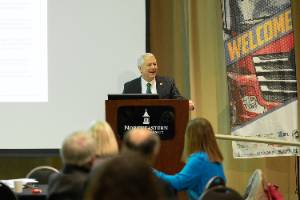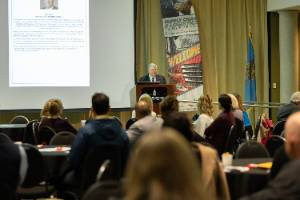Leaders gather for supply chain and logistics conference at NSU-Broken Arrow campus
BROKEN ARROW, Okla. —According to Don Morris, executive director of the Oklahoma Office of Workforce Development, jobs in the supply chain and logistics sector make up a large share of Oklahoma’s top 100 critical occupations list.
Speaking at the 2nd Annual Supply Chain and Logistics Conference on Thursday, Morris said he never thought registered nurses would be surpassed on the top critical occupations in Oklahoma list—but they have.
The list, featured on the Oklahoma Works website, currently shows heavy and tractor-trailer truck drivers at number one followed by general and operations managers. Registered nurses are currently sitting at number three.
Morris said in 2021, supply chain and logistics made up 7.8% of the total jobs in Oklahoma or 122,122 total jobs. He added that by 2026, it is expected to grow by an additional 6.9%.
“[This sector] is very, very critical to our state,” Morris said. “This is an industry in Oklahoma that’s really growing.”
Spotlighting the critical nature of the supply chain and logistics industry in Oklahoma was the motivation behind the conference at NSUBA that brought together business leaders, experts, higher education and legislative officials to discuss opportunities and challenges in the industry and build network connections with fellow employers and potential job seekers.
One of the top challenges discussed at the conference is finding the skilled workforce needed to fill these critical occupations. Morris said of the top 100 critical occupations more than a two-thirds of them require some type of postsecondary education, from certificates to degrees.
In addition, Morris said the current workforce is more focused on showing what one can do than what degree a person holds. He said higher education is working diligently to make sure that they are being responsive to this attitude shift.
“I think it’s very important that as we talk about supply chain and logistics workforce that we recognize the role higher education plays at every level,” NSU President Steve Turner said. “From micro-credentials to a doctorate, higher education continues to be a crucial partner for employers and employees alike to developing and growing a skilled workforce in Oklahoma.”
NSU College of Business & Technology Dean Dr. Janet Buzzard said NSU is making inroads in developing digital badges, certificates and micro-credentials in response to meeting this workforce focus. Micro-credentials are an affordable, flexible way for students to earn in-demand skills.
Buzzard said this involves breaking down the traditional credit-hour system into more competency-based achievements that align with specific skills employers are seeking. A digital badge highlighting the skills completed is issued once a student earns a micro-credential to show employers that they meet certain competencies.
Another benefit of micro-credentials, Buzzard said, is that they are stackable so the study dedicated to earning a micro-credential can create a pathway to earning a certificate or degree later if the student chooses.
Presented by the Supply Chain and Logistics Workforce Partnership, the conference is part of a broader effort of the partnership to raise awareness and education about career paths in the supply chain and logistics industry. Partners include Northeastern State University, Premier Logistics, Broken Arrow Economic Development Corporation, TulsaTech.edu, Oklahoma Manufacturing Alliance, Oklahoma Works, Broken Arrow Public Schools and the Oklahoma Department of Commerce.
These efforts are supported through sector partnership grants awarded to NSU and Premier Logistics by the Oklahoma Works Impact Grant program administered by the Oklahoma Office of Workforce Development.
“We’re here to endorse supply chain logistics and transportation,” President and CEO of Premier Logistics Jeff Mancini said. “We need to engage as a state and nation. We just have so much potential. There are some fantastic careers in our industry and it is the lifeline of our country. We need to keep pushing forward and exposing people.”
In addition to hosting the conference, NSU has been working with other members of the workforce partnership to promote and recruit individuals for the number of career opportunities in the supply chain and logistics sector.
Efforts include working with area high schools, career techs and two-year colleges to build out career pathways, give presentations, industry tours and scholarships to encourage individuals to seek careers in the supply chain sector.
“We have been able to get into high schools, on the floor of factories and award scholarships to both non-traditional and traditional students to recruit, retain and train individuals for this critical workforce,” Turner said. “With the support from our industry partners and the state, we look forward to continuing building upon these efforts with the goal of increasing labor participation in this sector which would only be a benefit for all Oklahomans.”
For more information about the Supply Chain & Logistics Workforce Partnership, visit https://www.supplychainlogisticswp.org/. Also, to learn more about supply chain management and operations educational options at NSU visit https://cbt.nsuok.edu/SCM/default.aspx.

NSU President Steve Turner talks to the crowd gathered at the Northeastern State University Broken Arrow campus for the 2nd Annual Supply Chain and Logistics Conference on March 2, 2023.

Don Morris, executive director of the Oklahoma Office of Workforce Development, talks to the crowd gathered at the Northeastern State University Broken Arrow campus for the 2nd Annual Supply Chain and Logistics Conference on March 2, 2023.
